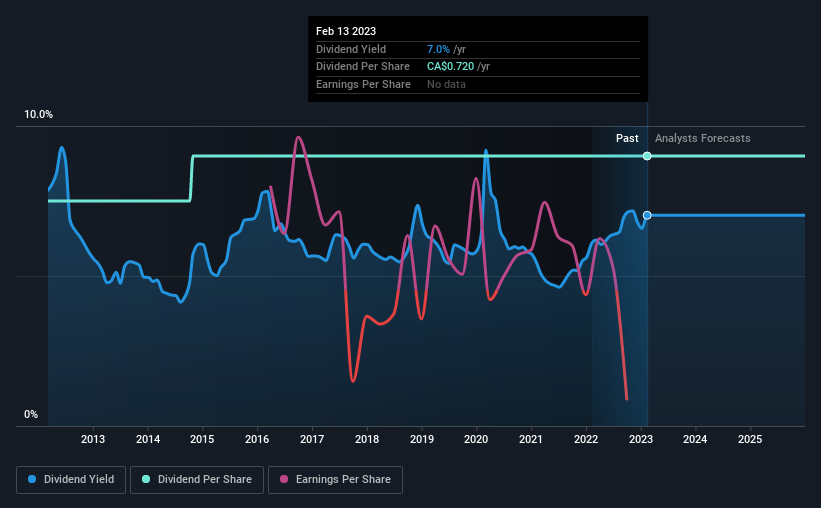Superior Plus Corp.'s (TSE:SPB) investors are due to receive a payment of CA$0.06 per share on 15th of March. Based on this payment, the dividend yield on the company's stock will be 7.0%, which is an attractive boost to shareholder returns.
See our latest analysis for Superior Plus
Superior Plus Doesn't Earn Enough To Cover Its Payments
We like to see robust dividend yields, but that doesn't matter if the payment isn't sustainable. Superior Plus isn't generating any profits, and it is paying out a very high proportion of the cash it is earning. This is quite a strong warning sign that the dividend may not be sustainable.
Over the next year, EPS is forecast to expand by 104.0%. However, if the dividend continues along recent trends, it could start putting pressure on the balance sheet with the payout ratio getting very high over the next year.

Superior Plus Has A Solid Track Record
The company has an extended history of paying stable dividends. The annual payment during the last 10 years was CA$0.60 in 2013, and the most recent fiscal year payment was CA$0.72. This works out to be a compound annual growth rate (CAGR) of approximately 1.8% a year over that time. Slow and steady dividend growth might not sound that exciting, but dividends have been stable for ten years, which we think makes this a fairly attractive offer.
The Company Could Face Some Challenges Growing The Dividend
Some investors will be chomping at the bit to buy some of the company's stock based on its dividend history. Superior Plus has seen EPS rising for the last five years, at 17% per annum. Unprofitable companies aren't normally our pick for a dividend stock, but we like the growth that we have been seeing. All is not lost, but the future of the dividend definitely rests upon the company's ability to become profitable soon.
We should note that Superior Plus has issued stock equal to 14% of shares outstanding. Regularly doing this can be detrimental - it's hard to grow dividends per share when new shares are regularly being created.
Superior Plus' Dividend Doesn't Look Sustainable
In summary, while it's good to see that the dividend hasn't been cut, we are a bit cautious about Superior Plus' payments, as there could be some issues with sustaining them into the future. Although they have been consistent in the past, we think the payments are a little high to be sustained. This company is not in the top tier of income providing stocks.
It's important to note that companies having a consistent dividend policy will generate greater investor confidence than those having an erratic one. However, there are other things to consider for investors when analysing stock performance. Case in point: We've spotted 3 warning signs for Superior Plus (of which 2 are potentially serious!) you should know about. Looking for more high-yielding dividend ideas? Try our collection of strong dividend payers.
New: Manage All Your Stock Portfolios in One Place
We've created the ultimate portfolio companion for stock investors, and it's free.
• Connect an unlimited number of Portfolios and see your total in one currency
• Be alerted to new Warning Signs or Risks via email or mobile
• Track the Fair Value of your stocks
Have feedback on this article? Concerned about the content? Get in touch with us directly. Alternatively, email editorial-team (at) simplywallst.com.
This article by Simply Wall St is general in nature. We provide commentary based on historical data and analyst forecasts only using an unbiased methodology and our articles are not intended to be financial advice. It does not constitute a recommendation to buy or sell any stock, and does not take account of your objectives, or your financial situation. We aim to bring you long-term focused analysis driven by fundamental data. Note that our analysis may not factor in the latest price-sensitive company announcements or qualitative material. Simply Wall St has no position in any stocks mentioned.
About TSX:SPB
Superior Plus
Distributes propane, compressed natural gas, and renewable energy and related products and services in the United States and Canada.
Fair value with limited growth.
Similar Companies
Market Insights
Community Narratives




